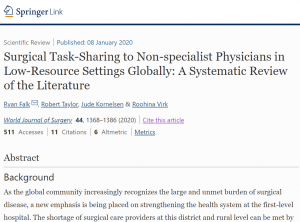 Dr. Ryan Falk, co-instructor of SURG 518, along with colleagues recently published an article that seeks to explore where, across all country income groups, NSPs are providing surgical services and what additional surgical training, if any, is available in each identified country.
Dr. Ryan Falk, co-instructor of SURG 518, along with colleagues recently published an article that seeks to explore where, across all country income groups, NSPs are providing surgical services and what additional surgical training, if any, is available in each identified country.
To read the full text, please visit here.
Abstract
Background: As the global community increasingly recognizes the large and unmet burden of surgical disease, a new emphasis is being placed on strengthening the health system at the first-level hospital. The shortage of surgical care providers at this district and rural level can be met by surgical task-shifting/sharing to non-physician clinicians (NPCs) and non-specialist physicians (NSPs). While the role of NPCs in low–middle-income countries (LMICs), in particular in sub-Saharan Africa (SSA), has been well documented in the literature, there has been little focus on NSPs. In addition to providing essential surgical services, this physician cadre also practices generalist medicine, an advantage at the first-level hospital. The present study seeks to explore where, across all country income groups, NSPs are providing surgical services and what additional surgical training, if any, is available in each identified country.
Methods: A systematic review of the literature was performed, following PRISMA guidelines. Medline, EMBASE, EBM Reviews, and CINAHL were searched. Including hand-searching for further references, 53 publications met inclusion/exclusion criteria and were identified for data extraction purposes. Gray literature was also explored within the time limits for this study.
Results: Surgical task-shifting/sharing to NSPs occurs across all country income groups; some provide surgical obstetrics, while others also provide a broader scope of surgical services. Within LMIC countries, the majority are in SSA. In SSA, 16 of 54 countries were included in the reviewed articles, only 4 of which (Ethiopia, Niger, Nigeria, and Sierra Leone) have a formal surgical program beyond the regular medical officer/general practitioner training. Canada and Australia have established programs for both surgical obstetrics and the broader scope, while the USA has several programs for surgical obstetrics and is developing a new, broad-scope program.
Conclusion: This study has demonstrated that NSPs are providing surgical services across all income groups, with varying degrees of additional training specific to the surgical needs of their district/rural location. To “close the gap” in needed surgical services at the first-level hospital, more task-sharing needs to occur to both NSPs (the focus of this study) and NPCs. Collaboration between practitioners and training programs, given the shared challenges and practice environments, would help support task-sharing at the first-level hospital and improve access to the 5 billion underserved people.
